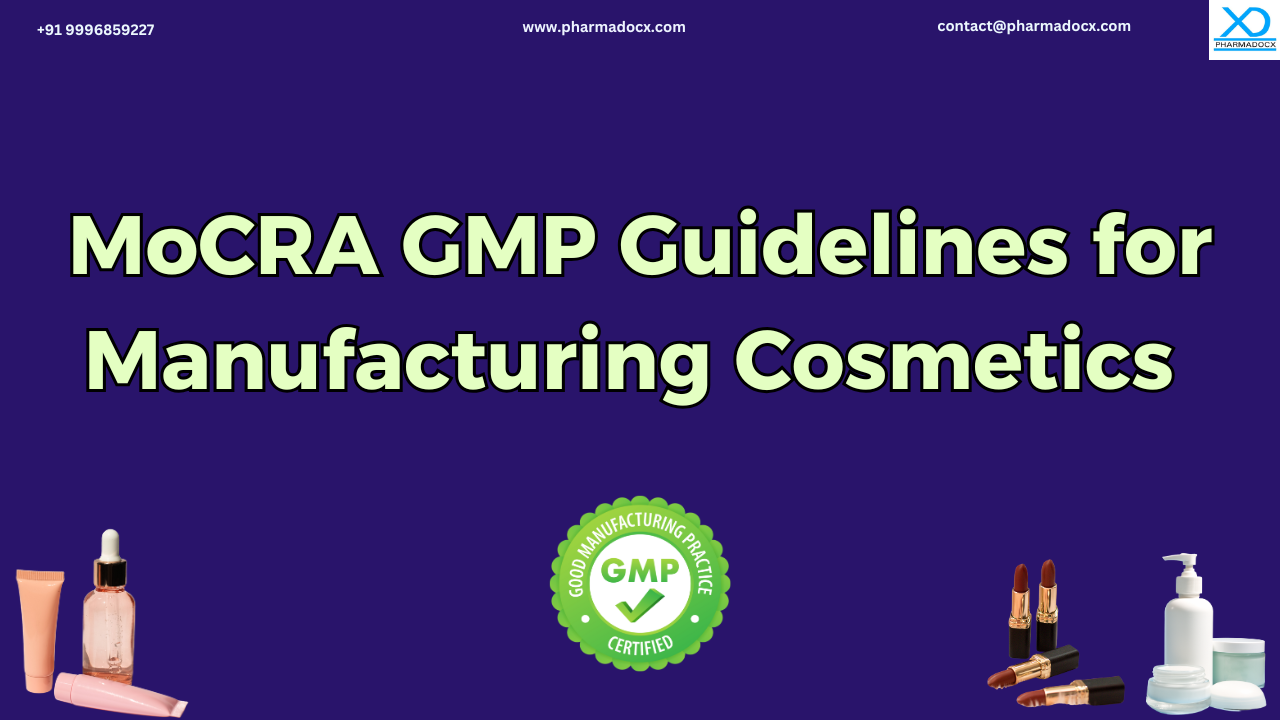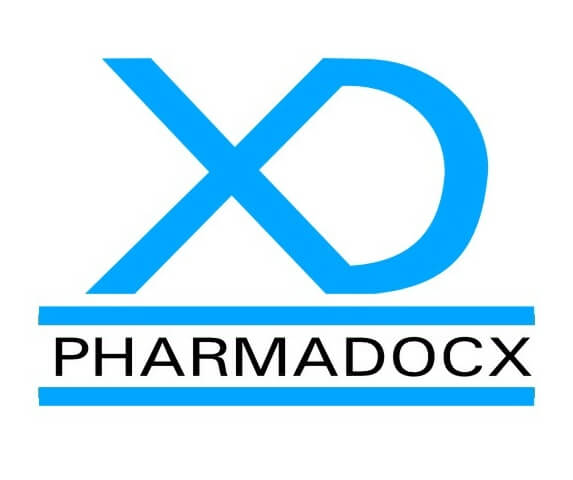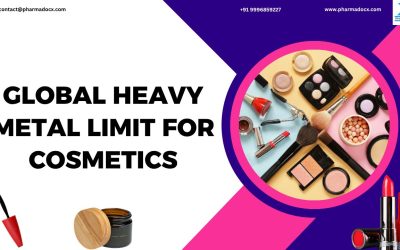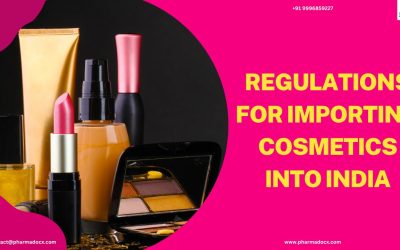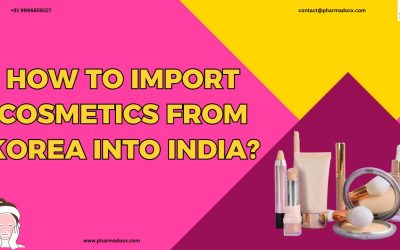Increased regulation and oversight of the quality and safety of cosmetic products are required to safeguard consumer health. Implementation of the Modernization of Cosmetic Regulation Act (MoCRA) has ushered in a new regulatory era for the cosmetics industry. As per MoCRA requirements, compliance with cosmetics GMP guidelines will become mandatory. Furthermore, cosmetics product companies may have to furnish proof of evidence of GMP compliance. Thus, awareness of MoCRA GMP guidelines is vital for companies involved in cosmetics manufacturing industry. Notably, the cornerstone of MoCRA compliance lies in adherence with cosmetics GMP regulations. Hence, we have curated this MoCRA GMP guideline compliance guide to help cosmetics companies.
Stringent good manufacturing practice (GMP) guideline compliance minimizes the risk of product adulteration or misbranding. Hence, for a long period, pharmaceutical, medical device, and food industries have been following GMP. Thus, MoCRA guidelines have mandated the FDA to propose GMP regulations for the cosmetics industry. This will help fulfil the aim of delivering high-quality and safe cosmetics to consumers.
What are cosmetics good manufacturing practices (GMP)?
Cosmetics good manufacturing practices (GMP) help ensure consistency in quality standards of the product. GMP guidelines cover all areas of cosmetics manufacturing from facility, equipment, personnel, product manufacturing, packaging to warehousing and recordkeeping. These guidelines are in place to ensure products meet certain quality benchmarks throughout all stages of production, packaging, storage, and shipment. Compliance with these guidelines is vital to avoid adulteration or misbranding of cosmetics products.
ISO 22716:2007 forms the core of cosmetics GMP guidelines. It presents the standards and guidelines for cosmetics production, quality control, storage, and shipment. These guidelines cover the quality aspects of cosmetics production.
MoCRA GMP guidelines: Timeline for mandatory compliance
GMP is an integral component of MoCRA. It provides guidelines for safe and consistent cosmetics manufacturing to meet high-quality benchmarks. MoCRA requires the US FDA to create custom GMP guidelines for cosmetics facilities that will be in line with global standards. This will help protect public health and prevent cosmetics product adulteration. Thus, cosmetics manufacturers are required to mandatorily follow MoCRA GMP guidelines to ensure product safety.
The MoCRA has mandated the FDA to present proposed cosmetics GMP regulations within 2 years of enactment. Hence, by the end of 2025, as per MoCRA requirements, compliance with GMP guidelines will become an FDA-mandated requirement. Thus, cosmetics companies and personnel involved in manufacturing cosmetics will have to familiarise themselves with cosmetics GMP guidelines. Furthermore, by December 29, 2025, all cosmetics companies will be expected to provide evidence of compliance with MoCRA GMP guidelines. Moreover, MoCRA has bestowed the US FDA with the power of inspecting records to verify cosmetics GMP regulatory compliance.
Compliance with MoCRA GMP guidelines for cosmetics industry
MoCRA GMP guidelines aim to ensure the quality and safety of cosmetics products. Hence, compliance with cosmetics GMP guidelines is mandatory to abide by MoCRA. We have highlighted the 12 key focus areas of MoCRA GMP guidelines for the cosmetics industry.
- Cosmetics manufacturing facility and equipment: The cosmetics manufacturing facility must be of suitable size and design, with adequate space for the equipment. Moreover, the walls, floors, and ceilings should be constructed of smooth and easily cleanable surfaces. This is required to adhere to hygiene standards and prevent contamination. Additionally, pest controls, proper lighting, ventilation, and clean plumbing are essential to maintain a sanitary environment. Furthermore, the facility and equipment must be regularly cleaned and maintained. Regular equipment calibration and maintenance are vital for accurate measurements and maintaining product quality. Moreover, the equipment to be used should be properly validated.
- Personnel involved in manufacturing: Proper training and supervision of personnel involved in cosmetics manufacturing are essential to maintain a clean and safe working environment. Additionally, the personnel should wear appropriate clothing and protective gear as well as adhere to hygiene standards. Furthermore, comprehensive training programs should be regularly imparted to personnel to ensure adherence to correct MoCRA GMP guidelines.
- Raw materials: Raw materials to be used for manufacturing cosmetics must be stored and handled carefully to prevent contamination and degradation. Prior to using the raw materials, they should be tested to ensure they meet quality specifications.
- Colour additives: Compliance with approved colour additive guidelines is vital to avoid regulatory sanctions.
- Water: The quality of water to be used for manufacturing the cosmetics should be tested and monitored. The chemical, physical, and microbiological standards of the water should be evaluated.
- Prohibited and restricted ingredients: Cosmetics manufacturers should update themselves with regulatory guidelines for restricted ingredients. They must ensure their products do not contain prohibited ingredients.
- Product testing: The cosmetics product must be regularly tested for stability, efficacy, and microbiological safety to ensure they meet safety and quality standards. All supporting safety data for the product must be procured using scientifically sound methods. The responsible person must maintain records of the data demonstrating the safety of their products.
- Hygiene practices: Strict hygiene practices should be enforced to prevent any potential contamination. Furthermore, in line with MoCRA GMP guidelines, for manufacturing cosmetics, cleanrooms should be used. These rooms provide a controlled environment with regulated temperature, humidity, and microbial levels. This is vital for ensuring the cosmetics products are manufactured in optimal manufacturing conditions.
- Cosmetics product packaging and labelling: The packaging materials to be used for the cosmetics should be suitable for the intended use and prevent contamination. Furthermore, the label should contain domestic address, phone number, and electronic contact information of the responsible person. Additionally, presence of any fragrance allergens in the product should be mentioned.
- Quality control measures: Product quality control measures must be strategically implemented at various stages of cosmetics production to ensure the products meet the specific quality benchmarks. The quality control test should focus on evaluating purity, stability, and safety of the products. This is required to guarantee the products meet quality standards and will help assure consumers of consistent product quality.
- Proper documentation: MoCRA guidelines emphasize the importance of comprehensive documentation. Detailed documentation of all aspects of the cosmetics production process, including manufacturing processes, raw materials, and quality control measures, should be maintained. This will help prevent errors and ensures traceability. Additionally, proper documentation facilitates the identification of issues during production.
- Record keeping: MoCRA guidelines require the responsible person to retain all manufacturing and GMP compliance records. The records should capture details of operations, procedures, tests, and other relevant information. Moreover, proper record-keeping ensures consistent product quality and supports recall efforts, if required. Furthermore, the MoCRA has granted the FDA the authority to access and copy records associated with a product, if needed. Hence, compliance with MoCRA guidelines requires proper record keeping.
Exemption from MoCRA GMP guidelines
MoCRA guidelines offer exemptions to certain small businesses from GMP, facility registration, and product listing requirements. However, manufacturers involved in producing cosmetics intended for internal use, contact with the mucus membrane of the eye, or injection are not eligible for these exemptions.
Pharmadocx Consultants: Your trusted MoCRA regulatory partner
Non-compliance with MoCRA GMP guidelines can lead to severe regulatory and legal consequences. It can lead to mandatory recalls, inspections, and even suspension of facility registration. The authorities can issue warning letters as well demand penalties or fines. Hence, MoCRA GMP guideline compliance is mandatory. However, to comply with these guidelines, you need to have an understanding of MoCRA. As cosmetics manufacturing companies, it is not possible to be aware of the nitty-gritties of MoCRA regulations. With the support of an experienced MoCRA regulatory partner, MoCRA guideline compliance can be a cake walk. Our team of experts has in-depth knowledge and extensive expertise in MoCRA guidelines. To appoint us as your US cosmetics regulatory partner, drop an email at [email protected] or call/Whatsapp on 9996859227.
Related posts
MoCRA Guidelines for Cosmetics Industry
Latest US FDA Cosmetics Labelling Guidelines
MoCRA Cosmetics Facility Registration
MoCRA Safety Substantiation Requirements

